The colder months often bring shorter days, less sunlight, and a drop in temperatures, which can significantly affect mood and well-being. For individuals struggling with substance use, this seasonal shift can create additional challenges. Many people experience winter depression, a type of seasonal affective disorder (SAD) characterized by feelings of sadness, fatigue, and withdrawal. When combined with addiction, these struggles can intensify. Understanding how seasonal changes impact substance use and finding an appropriate addiction treatment program is essential for recovery and well-being.
What Is Winter Depression?
Winter depression, often referred to as seasonal affective disorder, is a form of depression that occurs primarily during the colder months of the year. Reduced exposure to natural sunlight disrupts the body’s internal clock, impacting serotonin and melatonin levels—chemicals that regulate mood and sleep. This can lead to symptoms like:
- Persistent fatigue
- Loss of interest in activities
- Difficulty concentrating
- Increased cravings for carbohydrates or alcohol
- Social withdrawal
For individuals already navigating substance use challenges, the added burden of winter depression can exacerbate their struggles, making recovery even more difficult.
The Link Between Seasonal Depression and Addiction
The connection between seasonal depression and addiction lies in how individuals cope with emotional and physical discomfort during the winter months. People may turn to alcohol or drugs as a way to self-medicate the symptoms of winter depression. For example:
- Alcohol use – Alcohol is often used to numb feelings of sadness or anxiety, but its depressant effects can worsen these emotions over time.
- Drug use – Drugs may provide temporary relief from fatigue or low energy levels but ultimately exacerbate emotional and physical challenges.
When untreated, the combination of seasonal affective disorder and addiction can create a vicious cycle. Substance use may temporarily mask depressive symptoms, but it often leads to deeper emotional struggles, physical health issues, and difficulty managing daily life.
Why Addiction During Winter Feels Different
Addiction during winter can feel more challenging due to unique seasonal factors:
- Isolation – Cold weather and shorter days often discourage social interaction, leading to feelings of loneliness that may trigger substance use.
- Reduced activity levels – Fewer opportunities for outdoor activities or exercise can result in lower energy and motivation, increasing the appeal of substances for temporary stimulation.
- Holiday triggers – The winter season is full of holidays, which may bring stress, family conflicts, or pressure to drink or use substances in social settings.
- Physical discomfort – The cold, combined with the physical effects of substance use, can lead to compounded discomfort, pushing individuals toward unhealthy coping mechanisms.
Recognizing these challenges and seeking support early can prevent the cycle from spiraling further.
How to Address Seasonal Depression and Addiction
Addressing the combined effects of winter depression and substance use requires a comprehensive approach that tackles both issues simultaneously. Here are some steps to consider:
- Find a supportive addiction treatment program – A holistic program, like those offered at Sophros Recovery, can help individuals build coping skills, develop healthier habits, and address the underlying factors contributing to substance use.
- Focus on light exposure – Light therapy, spending time outdoors, and ensuring your living space is well-lit can help alleviate some symptoms of winter depression.
- Develop a routine – Establishing a structured daily routine with consistent sleep, meals, and activities can combat the lethargy and unpredictability of seasonal depression.
- Seek therapy – Evidence-based therapies, such as cognitive behavioral therapy (CBT) or dialectical behavior therapy (DBT), can help individuals identify triggers and build resilience against cravings and emotional distress.
- Practice mindfulness and self-care – Activities like meditation, yoga, and mindfulness can improve emotional regulation and reduce stress during challenging times.
In addition, surround yourself with understanding friends, family, or recovery groups who can provide encouragement and accountability.
Call Sophros Recovery to Address Winter Depression in an Addiction Treatment Program
If you’re struggling with addiction during winter or find that seasonal depression is complicating your recovery, reach out to Sophros Recovery. Our compassionate team is here to help you overcome these challenges and build a healthier, more fulfilling future.
Visit Sophros Recovery online or call 866.374.0541 to learn more about our addiction treatment programs. Together, we can help you find balance, resilience, and the support you need to thrive all year round.







